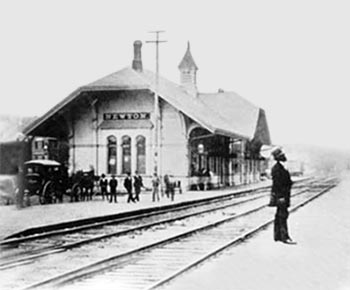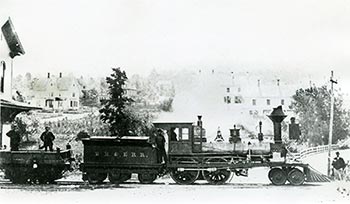American Railroads 1842
Charles Dickens describes his first trip on an American railway
Charles Dickens - American Notes - Condensed from Chapter Four
I made acquaintance with an American railroad, on this occasion, for the first time. As these works are pretty much alike all through the States, their general characteristics are easily described.
There are no first and second class carriages as with us; but there is a gentleman's car and a ladies' car: the main distinction between which is that in the first, everybody smokes; and in the second, nobody does. As a black man never travels with a white one, there is also a negro car; which is a great, blundering, clumsy chest, such as Gulliver put to sea in, from the kingdom of Brobdingnag. There is a great deal of jolting, a great deal of noise, a great deal of wall, not much window, a locomotive engine, a shriek, and a bell.
The cars are like shabby omnibuses, but larger: holding thirty, forty, fifty, people. The seats, instead of stretching from end to end, are placed crosswise. Each seat holds two persons. There is a long row of them on each side of the caravan, a narrow passage up the middle, and a door at both ends. In the centre of the carriage there is usually a stove, fed with charcoal or anthracite coal; which is for the most part red-hot. It is insufferably close; and you see the hot air fluttering between yourself and any other object you may happen to look at, like the ghost of smoke.
In the ladies' car, there are a great many gentlemen who have ladies with them. There are also a great many ladies who have nobody with them: for any lady may travel alone, from one end of the United States to the other, and be certain of the most courteous and considerate treatment everywhere. The conductor or check-taker, or guard, or whatever he may be, wears no uniform. He walks up and down the car, and in and out of it, as his fancy dictates; leans against the door with his hands in his pockets and stares at you, if you chance to be a stranger; or enters into conversation with the passengers about him. A great many newspapers are pulled out, and a few of them are read. Everybody talks to you, or to anybody else who hits his fancy. If you are an Englishman, he expects that that railroad is pretty much like an English railroad. If you say 'No,' he says 'Yes?' (interrogatively), and asks in what respect they differ. You enumerate the heads of difference, one by one, and he says 'Yes?' (still interrogatively) to each. Then he guesses that you don't travel faster in England; and on your replying that you do, says 'Yes?' again (still interrogatively), and it is quite evident, don't believe it. After a long pause he remarks, partly to you, and partly to the knob on the top of his stick, that 'Yankees are reckoned to be considerable of a go-ahead people too;' upon which YOU say 'Yes,' and then HE says 'Yes' again (affirmatively this time); and upon your looking out of window, tells you that behind that hill, and some three miles from the next station, there is a clever town in a smart lo-ca-tion, where he expects you have concluded to stop. Your answer in the negative naturally leads to more questions in reference to your intended route (always pronounced rout); and wherever you are going, you invariably learn that you can't get there without immense difficulty and danger, and that all the great sights are somewhere else.
If a lady take a fancy to any male passenger's seat, the gentleman who accompanies her gives him notice of the fact, and he immediately vacates it with great politeness. Politics are much discussed, so are banks, so is cotton. Quiet people avoid the question of the Presidency, for there will be a new election in three years and a half, and party feeling runs very high: the great constitutional feature of this institution being, that directly the acrimony of the last election is over, the acrimony of the next one begins; which is an unspeakable comfort to all strong politicians and true lovers of their country: that is to say, to ninety-nine men and boys out of every ninety-nine and a quarter.
 Station in the Boston suburb of Newton in the 1840s
Station in the Boston suburb of Newton in the 1840sExcept when a branch road joins the main one, there is seldom more than one track of rails; so that the road is very narrow, and the view, where there is a deep cutting, by no means extensive. When there is not, the character of the scenery is always the same. Mile after mile of stunted trees: some hewn down by the axe, some blown down by the wind, some half fallen and resting on their neighbours, many mere logs half hidden in the swamp, others mouldered away to spongy chips. The very soil of the earth is made up of minute fragments such as these; each pool of stagnant water has its crust of vegetable rottenness; on every side there are the boughs, and trunks, and stumps of trees, in every possible stage of decay, decomposition, and neglect. Now you emerge for a few brief minutes on an open country, glittering with some bright lake or pool, broad as many an English river, but so small here that it scarcely has a name; now catch hasty glimpses of a distant town, with its clean white houses and their cool piazzas, its prim New England church and school-house; when whir-r-r-r! almost before you have seen them, comes the same dark screen: the stunted trees, the stumps, the logs, the stagnant water - all so like the last that you seem to have been transported back again by magic.
The train calls at stations in the woods, where the wild impossibility of anybody having the smallest reason to get out, is only to be equalled by the apparently desperate hopelessness of there being anybody to get in. It rushes across the turnpike road, where there is no gate, no policeman, no signal: nothing but a rough wooden arch, on which is painted 'WHEN THE BELL RINGS, LOOK OUT FOR THE LOCOMOTIVE.' On it whirls headlong, dives through the woods again, emerges in the light, clatters over frail arches, rumbles upon the heavy ground, shoots beneath a wooden bridge which intercepts the light for a second like a wink, suddenly awakens all the slumbering echoes in the main street of a large town, and dashes on haphazard, pell-mell, neck-or-nothing, down the middle of the road. There - with mechanics working at their trades, and people leaning from their doors and windows, and boys flying kites and playing marbles, and men smoking, and women talking, and children crawling, and pigs burrowing, and unaccustomed horses plunging and rearing, close to the very rails - there - on, on, on - tears the mad dragon of an engine with its train of cars; scattering in all directions a shower of burning sparks from its wood fire; screeching, hissing, yelling, panting; until at last the thirsty monster stops beneath a covered way to drink, the people cluster round, and you have time to breathe again (American Notes-Pictures from Italy, p. 62-65).

 Copyright © 1997- David A. Perdue, All Rights Reserved.
Copyright © 1997- David A. Perdue, All Rights Reserved.